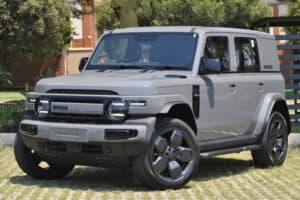Wolfsburg's most powerful people carrier will remain forbidden fruit for South Africa as its current EV trial only involves the ID.4.

Having expanded its performance electric GTX moniker to the ID.3 and ID.7 Tourer last week, Volkswagen has debuted two more variants based on the standard and long wheelbase versions of the ID. Buzz.
Hotted-up styling
Additions that ups the GTX model count to five after the mentioned pair, plus the ID.4 that debuted the designation three years ago, the ID. Buzz GTX also becomes the Volkswagen Commercial Vehicle Division’s sportiest model, though unlike the combustion engine Ford Transit Custom Sport, the panel van focused Cargo is omitted from the range.
ALSO READ: Finally out: Volkswagen ID. Buzz switch flicked
Dimensionally unchanged from the regular short-and-long wheelbase, the GTX’s added spice, externally, involves the fitting of the Matrix I.Q. LED headlights, standard 20-inch or optional 21-inch alloy wheels – the latter in two designs – a gloss black lower air intake with a honeycomb pattern and the GTX front bumper and fog lamps.

Along with extended door sills, a redesigned rear bumper and black accents, the GTX badge takes pride of place underneath the Volkswagen badge on the bootlid, with the final additions being gloss black mirror caps and a new colour called Cherry Red available as either a mono-tone hue, or in-combination with a silver roof and front facia.
Space maxed
On the practicality front, the regular ID. Buzz GTX seats five or six in 2-3 or 2-2-2 configuration, while the long wheelbase, which measures 254 mm longer with a wheelbase extension of 251 mm, boasts the same layout, but with the option of a 2-3-2 for a seven-seat capability.

In five-seat form, the ID. Buzz GTX has a claimed boot space of 1 121-litres, which extends to 2 205-litres with the second row not in use.
For the long wheelbase, space ranges from 306-litres in seven-seat mode, to 1 340-litres with the third row dropped. With the second row also tucked away, space maxes out at 2 469-litres.

Able to tow 1 600 kg or 1 800 kg in the case of the standard wheelbase, Volkswagen has kept the ID. Buzz’s dynamic’s unchanged despite the GTX moniker, although the same doesn’t apply to the interior.
Subtle racy changes inside
While the freestanding Digital Cockpit instrument cluster is carried over, the infotainment system now measures 12.9-inches instead of 12-inches, in addition to being furnished with improved voice recognition, the latest MIB software and integrated ChatGPT.

Although optionally available with a new Head-Up Display, standard other interior fittings comprise a black roofliner, GTX embroidered front seat headrests, the GTX steering wheel with red stitching and diamond-pattern so-called eco microfleece seat upholstery with red stich work and piping.
Added voltage
In terms of power, the ID. Buzz GTX boasts the dual-motor electric configuration, making it all-wheel-drive, but with a difference in battery size; 82-kWh in the five-seat ID. Buzz and 91-kWh in the long wheelbase.

Regardless, the final amount to 250 kW with the top speed being limited to 160 km/h. While no range figure was provided, Volkswagen did confirm a 0-100 km/h sprint time of 6.5 seconds, most likely applicable to the five-seater only given the added weight of the long wheelbase.
Supporting DC charging between 185 kW and 200 kW requires a waiting time of 26 minutes from 10-80%.
Not for us
On-sale in Europe from around June this year, the ID. Buzz GTX, as with the regular models, won’t be available to the general public anytime soon as Volkswagen’s well-known EV trial period involves only the ID.4.
NOW READ: Volkswagen turns the GTX voltage up on the ID.3 and ID.7 Tourer
Support Local Journalism
Add The Citizen as a Preferred Source on Google and follow us on Google News to see more of our trusted reporting in Google News and Top Stories.






